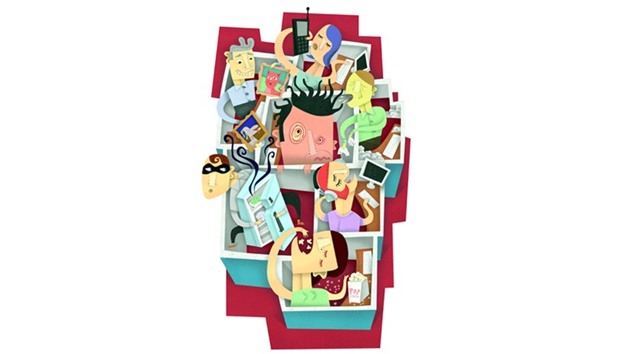You don’t have to be best friends, just be civil. That’s something a parent might say to a pair of constantly quibbling siblings, but it’s also an applicable line for anyone in the workplace.
We don’t have to all be pals, but we should, at the very least, be civil to each other. Unfortunately, that’s not happening, at least not enough.
Recent studies show that the number of people experiencing incivility at work has doubled over the past two decades, an odd trend when you consider the increased focus many companies have placed on dealing with harassment and workplace bullying.
Russell Johnson, an associate professor of management at the Eli Broad College of Business at Michigan State University, is co-author of a research paper on incivility published in the June edition of the Journal of Applied Psychology.
The paper explains the subtlety of incivility, noting that it “does not involve openly hostile behaviour, threats, or sabotage. As such, incivility is more benign and does not warrant the same legal attention or formal sanctions as other forms of mistreatment. Yet, it is a relatively frequent, low-intensity negative behaviour that has a substantial impact on employees”.
It could be as simple as a sarcastic reply to a co-worker’s comment during a meeting. Or a rude sentence in a poorly thought-out e-mail.
Johnson believes our increasing dependence on e-mail contributes to the rise in incivility.
“I think our communication is less direct,” he said in an interview. “A lot of our communication is done over phone or e-mail. It’s hard to understand the intent of an e-mail without any additional language or social or facial cues to go along with it. That creates more ambiguity. And it makes it easier to be uncivil when you’re not face-to-face with someone.”
Johnson’s research focuses on how mental fatigue – often brought on by a person processing the incivility of others – can increase incivility, “turning victims of incivility into perpetrators”.
It takes mental energy to not give in to our more base urges. Our mental energy gets drained throughout the day as we work, and dealing with another person’s incivility is an extra drain on that energy.
Again, this is more subtle than direct harassment or bullying. Someone could make an offhand comment, but that requires us to try to decode what that comment meant, why the person said it and how – or if – we should respond. Those kind of mental gymnastics can wear us down over the course of a day.
And the more worn down we are mentally, the more likely we are to lose our sense of civility.
“When you’re mentally depleted, that’s when these things are more likely to happen,” Johnson said. “I think a lot of times people are drained at work and so it’s not necessarily intentional, they just lack the willpower or effort to kind of suppress it. If someone says something ridiculous at work your immediate response might be a sarcastic remark. If you have the energy to suppress that, you might not say it, but if you don’t it might just come out.”
Thus, as Johnson says: “Incivility begets incivility.”
And one of the big problems is that incivility is sneaky. It’s not in-your-face, like harassment or bullying.
Johnson’s study notes that “because incivility (a) reflects a mild form of mistreatment that is likely to go unpunished, (b) is not limited to interactions with those in authority positions, and (c) is easily denied and therefore excused, it occurs more frequently than other forms of mistreatment and, thus, has the potential to create a noxious social environment.”
I hate noxious social environments!
The next logical question is: How do we fix all this and make every workplace civil?
That’s an impossible goal, of course, but there are ways to make improvements.
Johnson said that incivility is exacerbated in “political” workplaces, offices that lack clarity on the type of behaviour that’s valued. Workers in political settings tend to act in their own self-interest rather than thinking of others first.
So a good first step for managers is to make sure they are clearly communicating the kind of values and behaviours – things like treating others with respect – that are sought and rewarded.
For the individual worker, since mental fatigue plays such a large role in the spread of incivility, a key is making an effort to be mentally fresh. That means basic things like getting enough sleep and making sure you’re taking an occasional break from work to clear your head and recharge.
Along with fatigue, I believe much of our uncivil behaviour happens because we’re also racing around so much – mentally and physically – that we don’t stop to remind ourselves to be nice. It’s a sad state of affairs when we need a prompt to keep us from being jerks, but that seems to be where we’re at in the modern world.
So I have a simple suggestion. Print out a sign to hang in your cubicle, or a small strip of paper to tape to the edge of your laptop screen: Be Civil.
It’s just a reminder. Maybe something that catches your eye as you’re about to fire off an ornery e-mail. Or something you see as you’re getting up to head to a meeting.
The only thing we can really control is our own civility. So why not give our fatigued minds an occasional visual cue to keep on a civil path?
*Rex Huppke writes for the Chicago Tribune. Send him questions by e-mail at [email protected] or on Twitter @RexWorksHere

